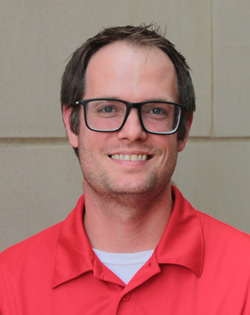Biology

- Assistant Professor
- joseph.marquardt@wku.edu
- KTH 3014
- Curriculum Vitae
Biol 319: Introduction to Molecular and Cell Biology
Biol 120: Biological Concepts: Cells Metabolism and Genetics
Biol 350: Introduction to Recombinant Genetics
Research
The Marquardt Lab is interested in how cells regulate the many shapes they adopt in nature. We investigate this mechanism using the budding yeast model system Saccharomyces cerevisiae. The benefits of using this system to study cell shape are numerous: the individual cells are each an independent organism for studying effects on a population level, the genome has been fully sequenced, genetic manipulations such as deletions and tagging can be done very easily, and most mechanisms are fully conserved with all eukaryotic systems (including humans!). Due to the ease of use and simplicity of the organism, experiments can be easily done by students of all levels. We use standard microbiology and molecular biology techniques such as PCR, gel electrophoresis, plasmid cloning, and microscopy to perform all our experiments.
Since cell shape control is a precise network of cell cycle and cell growth machinery, discoveries in our lab can be applied to other fields such as cancer prevention, development, and neurobiology. Some pathogenic fungal species also use regulated cell shape changes to affect their pathogenicity. Being able to use a non-pathogenic yeast species like S. cerevisiae to investigate these mechanisms will allow us to better understand the best ways to target pathogenic fungal species for treatment in patients.
Ph.D., Molecular Genetics, The Ohio State University, May 2017
B.S., Recombinant Gene Technology, Western Kentucky University, May 2010
2020 Regeneron Innovation Prize applicant chosen to represent the University of Pennsylvania
2014 American Society for Cell Biology Graduate Student Travel Award
2012 Graduate Teaching Assistant Award, Department of Molecular Genetics, The Ohio State University
2013 Pelotonia Graduate Student Research Fellowship, The Ohio State University, August 2013-December 2015
2009 Kentucky Academy of Science Undergraduate Research Grant, “Molecular Tools for Understanding the Population Genetic Effects of Habitat Restoration on Butterflies,” Western Kentucky University, May 2009-May 2010
2009 Sigma Xi Undergraduate Research Grant, “Molecular Tools for Understanding the Population Genetic Effects of Habitat Restoration on Butterflies,” Western Kentucky University, May 2009-May 2010
Marquardt, J., Chen,X., and Bi,E. (In Press). Septin assembly and remodeling at the cell division site during the cell cycle. Frontiers in Cell and Developmental Biology.
Marquardt, J., Yao, L., Okada, H., and Bi, E. (2020). The LKB1-like Kinase Elm1 Controls Septin Hourglass Assembly and Stability by Regulating Filament Pairing. Current Biology, 30(12), 2386-2394.
Marquardt, J., Chen, X., and Bi, E. (2019). Architecture, remodeling, and functions of the septin cytoskeleton. Cytoskeleton (Hoboken), 76(1), 7-14.
Marquardt, J. and Marcus, J. (2018). Molecular tools for understanding landscape genetics and the population genetic effects of habitat restoration on butterflies. Journal of the Lepidopterists’ Society, 72(4), 253-264.
Marquardt, J., Perkins, J., Beuoy, K.*, and Fisk, H. (2016). Modular elements of the tetratricopeptide repeats in the Mps1 amino-terminus target Mps1 to centrosomes and kinetochores. PNAS, 113(28), 7828-33.
Marquardt, J. and Fisk, H. (2016). ARHGEF17 Sets the timer for retention of Mps1 at kinetochores. JCB, 212(6), 615-616.
Majumder, S., Slabodonick, M., Pike, A., Marquardt, J., and Fisk, H. (2012). VDAC3 regulates centriole assembly by targeting Mps1 to centrosomes. Cell Cycle, 11(19), 3666-3678.
Some of the links on this page may require additional software to view.

